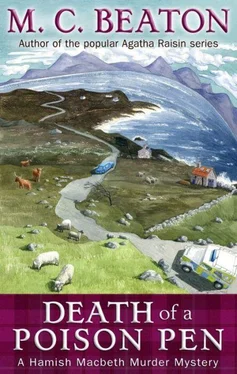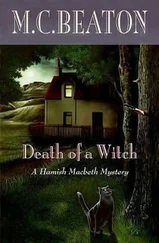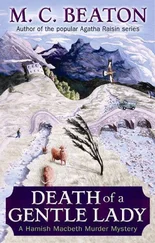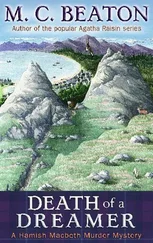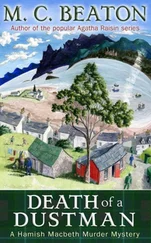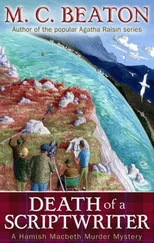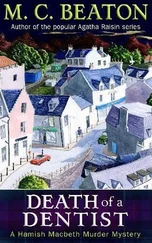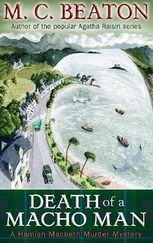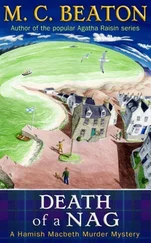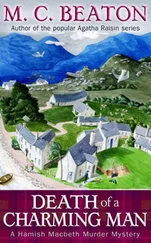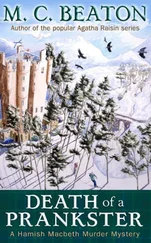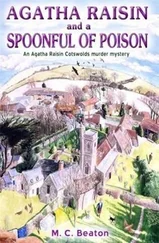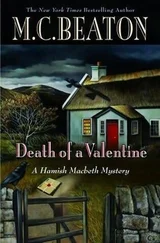“As a courtesy to old Mrs. Harris. I see you haven’t bothered.”
“Wasn’t time,” said Elspeth cheerfully. “I was out reporting. A wee boy got stuck up on the top of the falls.”
“Which one?”
“Diarmuid Patel. He was standing in the middle of the top of the falls, too scared to move one way or the other.”
“Not much of a story.”
“Not compared to murder and mayhem, but you forget, we’re a local Highland paper.”
“How’s your astrology piece doing? Haven’t read it lately.”
“Sam says it’s what sells the most papers. I’m good at it.”
Hamish snorted. “You’re good at making things up.”
A buffet of wind shook Elspeth’s small car as she moved along the coast road. “Another Sutherland gale,” said Elspeth. “When I see one of those nature films on television and they speed up the sky scenes so that the clouds race from horizon to horizon, I think they should come up here and find it doesn’t need any tricky camera work to make the sky look like that.”
Mrs. Harris came downstairs to meet them when they parked outside her building. In honour of the occasion, she had put a sort of 1940s make-up on her face: white powder and dark red lipstick.
Elspeth drove to the community hall and parked the car.
The hall was full, but Mr. Blakey had reserved them seats at the front. He thanked Hamish for his present of videos.
“I’m looking forward to this,” said Elspeth. “I didn’t see Green Card when it was first released.”
The elderly audience were rustling sweetie papers: The local shop nearby still sold sweets from large glass jars and put them in paper bags. An elderly woman next to Elspeth offered her a jelly baby from a large crumpled bag. Elspeth took one and murmured her thanks.
Elspeth turned to Hamish. “That’s a very small screen for a movie,” she said. “Actually, it’s not a screen. It’s just a telly.”
“All our Mr. Blakey could afford,” murmured Hamish. “Shh, it’s about to start.” Hamish wondered why so many should turn out on a cold windy night to watch a video on a television set when they could have rented one and watched it in the comfort of their homes, but then he reflected that the show was free and they obviously enjoyed each other’s company.
Elspeth settled back to enjoy the film but soon found her enjoyment impaired by the voices all around her. Some had seen it before and insisted on telling their neighbours what was going to happen next, and the deaf had companions who bellowed scraps of dialogue into their ears.
When the film was over, noisy and appreciative applause rang out. Mr. Blakey walked to the front of the room and held up his hands. “Before you all go,” he said, mopping his forehead with a large white handkerchief, “a video was delivered to me this morning from Help the Aged, suggesting you all might like to see it before you go home. It is only fifteen minutes long.”
He slotted the video in, pressed Play, and then signalled to someone at the back of the room to turn out the lights again.
At first there was nothing but white dots on black. “Must be broken,” someone shouted.
And then, suddenly, there was a picture of a room and the camera swung round to focus on a figure in a chair.
“That’s Miss Beattie!” came a chorus of horrified voices. There was another shot of a black screen with dancing lights and then a picture of Miss Beattie’s lifeless body, swinging this way and that.
Pandemonium erupted. The elderly screamed. Chairs were overturned. Some women fainted.
The screen went blank.
Hamish ran to the door and locked it and took out his phone and called for backup.
He turned and shouted, “Sit down, everybody. Nobody is to leave until statements are taken.”
Mr. Blakey confronted him. “But some of the women have fainted.”
“See they’re all right, and if there’s any sign of anything more serious than a fainting fit, let me know. How did you get that tape?”
“It was put through the hall letter box, I don’t know when. I found it when I came to open up. There was a letter with it.”
“I’ll need to see that. But first let’s get this lot calmed down.”
Hamish went up and stood in front of the now blank screen. Mr. Blakey switched on the lights. Elderly women were being helped back to their seats. The air was redolent with the scent of urine. Poor things, thought Hamish.
“Listen,” he said. “The police are going to need your help. We’ll not keep you any longer than possible. When backup arrives, leave your names and addresses and then you will be allowed to go home. If any of you can think of anything that’s of use, stay behind. Now, this tape, supposed to have come from Help the Aged, was put through the letter box of the hall. Anyone who saw anyone near the letter box, please let me know. Isn’t there usually refreshments served after the movie? I think a lot of you could do with a cup of tea.”
Six women got up meekly and headed to the kitchen off the hall. Hamish surveyed the audience.
The panic was slowly being replaced with a buzz of excitement. The ones who had fainted appeared to have recovered.
Mr. Blakey handed Hamish a letter. Hamish took out a pair of thin plastic gloves and took the letter from him and read it. It was typewritten. He read: “Dear Mr. Blakey: As a member of Help the Aged, I thought this fifteen-minute documentary might interest your members.” It was unsigned.
“What was I to think?” pleaded Mr. Blakey. “It had a label on the video, “Help the Aged.””
“You left it in the machine?”
“Yes, I just switched the machine off.”
There came a thumping at the door and a cry of “Police! Open up.”
Hamish went to the door and opened it. Jimmy Anderson stood there flanked by six policemen.
“We were doing door-to-door enquiries when we got your call,” said Jimmy. “What the hell’s going on?”
Hamish explianed. Jimmy ordered the policemen to go around and take names and addresses and told them to keep back anyone who had something of interest to say.
“Where’s the video?” he asked.
“In the machine. I thought it had better be left there for the forensic boys. This is the letter that came with it.”
Jimmy put on gloves, took the letter from Hamish, and put it in a glassine envelope.
Where’s Elspeth? wondered Hamish suddenly, looking around. Police were moving among the crowd, while women served tea and cakes and sandwiches. No Elspeth.
“Type up your statement when you get back to Lochdubh and then send it over,” said Jimmy. “In fact, you’d best be off and do that now.”
“I’d better talk to Mrs. Harris first. I brought her along with me.”
Hamish made his way to where she was sitting. “I know your name and address, Mrs. Harris,” he said, “so I can take you home.”
“Where’s that girl, Elspeth?”
“I don’t know,” replied Hamish. How was he to get back to Lochdubh if Elspeth had disappeared? Elderly people were gradually making their way out of the hall, now nervous and subdued. Hamish suppressed a groan. Of course, Elspeth would have run off to file a story, which Sam would send out to the news agencies and nationals. Braikie would be swarming with more press than ever before by the morning. And the pressure of the media would mean Blair back on the job, ranting and raving.
Hamish escorted Mrs. Harris outside. To his relief, Elspeth was sitting in her car, her mobile phone at her ear, talking busily. He rapped on the window. She said something into the phone and rang off.
Hamish and Mrs. Harris got into the car. “Are you all right?” Elspeth asked her.
“I cannae take it in yet,” said Mrs. Harris. “Was that really Amy in that fillum or was it some awful joke?”
Читать дальше
